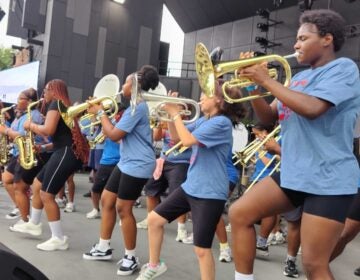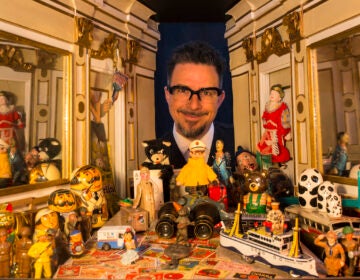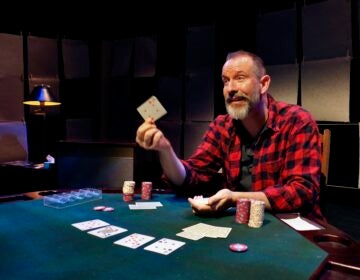A different sort of bloodstream for ‘Blood Wedding’ (Wilma Theater)
An old play becomes an altogether new experience in this adaptation of Federico García Lorca's classic.

The company of Wilma Theater's production of "Blood Wedding." (Photo courtesy of Bill Hebert)
Something old is very new in the wildly inventive storytelling that Wilma Theater applies to its production of Federico García Lorca’s “Blood Wedding.” The cast rips pieces from a wall and from the stage floor, then uses them as shrouds or tosses them to the side. Actors climb onto one another and up a wall to another playing area, or twist and twirl while they deliver lines, or do a sort of clog dance in bare feet. They walk on the seats of white chairs other performers move chair by chair to create a walking path. They punctuate a chase by bowing the strings of a bass violin they sit over or sprawl beside.
They generally behave unlike typical storytellers, moving their adaptation of Lorca’s classic in uncharted directions. Yet the story itself and Lorca’s beautiful words – translated from Spanish by Nahuel Telleria – remain unchanged. A young countryside bride still ditches her new husband on their wedding day and runs away with a former lover who’s married to another woman. They’re still chased down by the wedding party, which turns into a posse. A blood feud between the lover and the husband’s family still simmers throughout the plot.
It’s all the same but all different. How can that be? If you’ve seen two different productions of virtually anything, you know it happens. It just doesn’t happen quite at this expansive level, with such disparity between the conventional and the surreal. The effect is startling – you begin to see the way extreme movement, unexpected music (the cast sings both with and without orchestral accompaniment it provides) and variations in the tempo of the actors’ delivery are able to put you in a whole new world. And like them, you eventually run with it.
In the beginning, when the cast appears in Oana Botez’s colorful costumes and breaks into a long dance without musical accompaniment, the enterprise is mystifying. (I still don’t understand the need for the dance, except that it may limber the cast for the exacting intermissionless 110 minutes that follow, at least 10 minutes too much.) After that, the offbeat production – the Wilma calls it magical realism, although the term doesn’t quite do justice to the work – seems out of sync until you realize that the sync’s not going to change. You need to adapt to it.
“Blood Wedding” is a presentation of Wilma’s HotHouse troupe, an invention of the stage company’s leader, Blanka Zizka. (She won a best-director Barrymore Award this week for one of her productions last season.) Zizka has assembled a group of actors – some of them are the new generation of performers visible on many Philadelphia stages – for a bold experiment. They attend sessions to learn new techniques Zizka knows about from international connections, and she sends some of them to other countries for further study, or imports artistic directors to stage HotHouse work as part of the Wilma’s season.
In the case of “Blood Wedding,” the Hungarian director is also a choreographer named Csaba Horváth. The piece he’s put together with the HotHouse actors is stark and spare, but the effects of his techniques – the way the actors use their setting and each other – make it meatier than many productions that might be called opulent. His friend and collaborator, Csaba Ӧkrӧs, wrote music that at times may seem several steps away from what’s going on. But it’s a remarkable illumination of what’s happening in the characters’ heads.
Illumination, in fact, is highly critical in the production. A dozen chandeliers hang from the ceiling, and the lighting design by Thom Weaver (another Barrymore Award winner this past week, along with two of this show’s actors) plays with moods at least as much as the performers do. Campbell O’Hare is the bride whose flame burns for her former boyfriend, played by Lindsay Smiling. Her new husband, jilted hours into the wedding day, is Jered McLenigan, and his pathetic mother – her husband and son are already murdered when the story begins – is Jaylene Clark Owens.
The bride’s father, looking to increase his wealth and stability through the marriage, is Ed Swidey. Each of the other actors – Ross Beschler (playing the moon), Sarah Gliko, Justin Jain, Taysha Marie Canales, Brett Robinson and Matteo Scammell — makes distinct impressions in a variety of supporting roles, a phrase I use literally because of the complicated movement. Forbidden love, in this telling, is a moving pas de deux that is also a tug of war.
If you already know the full story of “Blood Wedding,” arguably the best known of Lorca’s 13 plays, you’ll see it differently here. If you don’t, you’ll get the full tale, no skimping. Either way it’s not just a night in the theater, it’s an experience.
—
“Blood Wedding” runs through Nov. 19 at Wilma Theater, Broad Street between Locust and Spruce Streets. 215-546-7824 or wilmatheater.org.
WHYY is your source for fact-based, in-depth journalism and information. As a nonprofit organization, we rely on financial support from readers like you. Please give today.




